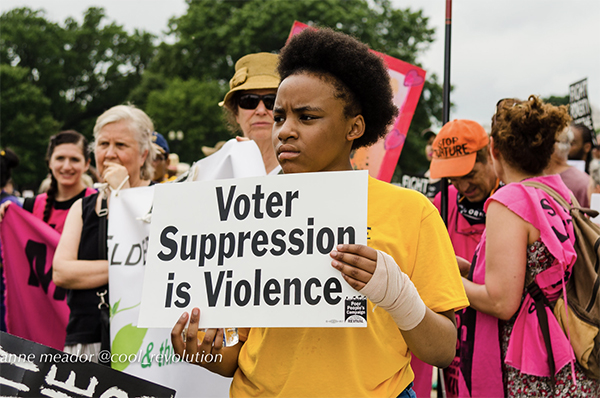
Photo/Ann Meadar
In late June, Republicans in the U.S. Senate blocked the most expansive voting rights legislation to come before Congress in decades. They used one of the most undemocratic of parliamentary procedures — the filibuster. The move was greeted with outrage and renewed calls to abolish the filibuster.
Approved by the U.S. House of Representatives in March, the “For the People Act” would set minimum standards for early and mail-in voting, roll back voting restrictions that Republican state legislatures have enacted recently, extend taxpayer financing to congressional campaigns, end gerrymandering of House districts, and apply new ethical standards to the president and vice-president.
On June 22, a motion for the U.S Senate to take up the measure failed on a 50-50 vote — 10 votes short of the number needed to end a filibuster. The blocking of the bill means that the systematic effort currently underway to attack the right to vote will continue without an important antidote to it. Recently, state legislatures in numerous states have pushed nearly 400 new bills and laws that would usher in many new voting restrictions, with at least 24 of those bills already signed into law.
The rejection of the “For the People Act” shows the undemocratic character of the U.S. Senate in general and the filibuster in particular.
HISTORY OF THE FILIBUSTER
The filibuster is an anti-democratic procedure designed to allow a small minority of senators to stop any bill they oppose. In 1805, an omission in an updated version of the Senate rulebook eliminated a formal means to cut off debate. Seizing on this loophole, Southern senators before the Civil War would give lengthy speeches to block measures they opposed. The first filibuster was engineered in 1841 by U.S. Senator John C. Calhoun of South Carolina, a fervent defender of slavery.
For many years, there was no way to cut off debate in the Senate. That meant that if a small minority of senators were willing to drone on for hours they could disrupt passage of laws supported by the majority. In 1917, the Senate adopted a new rule allowing for debate to cease if two-thirds of the Senate voted to end debate. (The percentage was later changed to three-fifths.) As a result, it now requires the vote of 60 of the 100 members of the U.S. Senate to get anything passed — because the final vote cannot occur until debate has closed. This means that a mere 41 Senators can block any measure. This is the case even if those 41 senators come from the smallest states (which contain only 11 percent of the U.S. population).
The “For the People Act” now joins a long list of important, progressive legislative measures which have been blocked throughout history by the filibuster. That list includes legislation in the first half of the 20th century to end poll taxes, to combat lynching, and to roll back employment discrimination. It extends to every civil rights bill introduced in the 20th century before 1957. From the slavery advocates like John C. Calhoun in the 1800s to the Dixiecrat segregationists of the 20th century to today’s practitioners of voter suppression, the most reactionary and conservative representatives of the ruling elite in this country have used the filibuster to undermine democracy.
In early 2020 and early 2021, millions of people put their own safety and health at risk by protesting in the streets and by voting during a pandemic. We cannot allow a stubborn minority of senators to stop our fight for justice. The filibuster rule can be changed at any time by a simple majority vote of the U.S. Senate – and the Democrats currently have a majority. The question now is whether the national leadership of the Democratic Party has the political will to ensure that the filibuster is abolished. “The people did not give Democrats the House, Senate and White House to compromise with insurrections,” wrote U.S. Representative Ayanna Pressley on Twitter. “Abolish the filibuster so we can do the people’s work.”
Chris Mahin is a writer, speaker and teacher on contemporary U.S. politics and history, particularly on the significance of the American Revolutionary War and Civil war eras for today. He is the Electoral Desk on the People’s Tribune Editorial Board.
